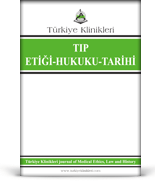Afet yönetiminde triaj uygulamaları, afetlere müdahalenin etkinliğini artırmak adına son yıllarda sıkça tartışma konusu olmaktadır. Birçok farklı değişkenle birlikte, triaj uygulamalarında etik ikilemlerin etkisi önemli bir tartışma konusudur. Bu çalışmada, etik ikilemlerin afet triajı üzerindeki olumsuz etkisinin değerlendirilmesi amaçlanmıştır. Çalışmada, afet triajı uygulamalarında etik ikilemlerin değerlendirilmesi adına, 173 katılımcı ile bir anket çalışması yapılmıştır. Anket çalışmasında, İzmir ili müdahale kurumları evren olarak belirlenmiş, örneklem bu kurumların personeli içerisinden basit rastgele örnekleme yöntemi ile seçilmiştir. Çalışmada yer alan katılımcıların %63,6'sı erkek ve yaş ortalaması 31,77±8,245 (yaş aralığı 18-57 yıl) yıldır. Katılımcıların %80,3'ü triaj eğitimi almıştır ve katılımcıların triaj ile ilgili en fazla yaşamış oldukları etik ikilemler, kıt kaynak kullanımı ve resüsitasyon kısıtlamaları ile ilgili olanlardır. Triaj uygulamalarında etik ikilem yaşama ile meslek grubu, görev yapılan kurum ve mesleki deneyim gibi değişkenler arasında istatistiksel açıdan anlamlı fark bulunmamaktadır. Çalışmada, triaj uygulamalarında müdahale personelinin yaşadığı etik ikilemlerin kıt kaynak kullanımı ve resüsitasyon kısıtlamaları çerçevesinde şekillendiği sonucuna ulaşılmıştır.
Anahtar Kelimeler: Afet triajı; etik ikilem; kıt kaynak kullanımı; triaj protokolleri
In recent years, triage practices in disaster management have been frequently discussed in order to increase the effectiveness of the disaster response. Together with many different variables, the effect of ethical dilemmas on triage practices is an important debate. In this study, it is aimed to investigate the negative effect of ethical dilemmas on disaster triage. A questionnaire study was conducted with 173 participants in order to evaluate ethical dilemmas in triage practices. In the questionnaire study, population is Izmir provincial response agencies. The sample consists of the staff of these institutions and is selected by simple random sampling method. Of the participants in the study, 63.6% were men, and the mean age of them was 31.77±8.245 years (ranging 18-57 years). 80.3% of the participants were trained in triage and participants had the most ethical dilemma about scarce resource use and resuscitation restrictions. There is no statistically significant difference between variables of ethical dilemma and occupational group, duty institution and professional experience in triage practices. In this study it is concluded that the ethical dilemmas experienced by the intervention personnel in triage applications were shaped within the framework of scarce resource utilization and resuscitation restrictions.
Keywords: Disaster triage; ethical dilemma; scarce resource usage; triage protocols
- Iserson KV, Moskop JC. Triage in medicine, part I: concept, history, and types. Ann Emerg Med. 2007;49(3):275-81. [Crossref] [PubMed]
- Şen G. Afetlerde Triaj ve Afet Triajının Etik Boyutu. Afet Triajında Etik Karar Verme: İzmir İli Örneği Uygulama Çalışması. 1. Baskı. İzmir: Kitapana; 2017. p.59-158. [PubMed]
- Lerner EB, Cone DC, Weinstein ES, Schwartz RB, Couble PL, Cronin M, et al. Mass casualty triage: an evaluation of the science and refinement of a national guideline. Disaster Med Public Health Prep. 2011;5(2):129-37. [Crossref] [PubMed]
- Vu A, Pant A. Planning emergency health services. Public Health Guide for Emergencies. 2nd ed. Geneva, Switzerland: Rosemarie North/International Federation of Red Cross and Red Crescent Societies; 2008. p.104-14.
- Ashton H. Legal and Ethical Aspects of First Medical Response to Disasters-Background Paper. Rome: International Workshop; 2008. p.22-5 (Section: Issues For Further Consideration).
- Linzer N, Sweifach J, Heft-LaPorte H. Triage and ethics: social workers on the front line. J Hum Behav Soc Environ. 2008;18(2):184-203. [Crossref]
- Christian M, Farmer J, Young B. Disaster triage and allocation of scarce resources; In: Fundamental Disaster Management. 3 rd ed. Mount Prospect, IL: Society of Critical Medicine; 2009. p.1-18. (12.01.2017). [Link]
- Sundnes KO, Birnbaum M. Ethical Issues. Prehospital and Disaster Medicine 2003;17(3):128-43. 23.02.2017. [Link]
- Dufresne S, Watt M, Lind D. Hazardous Materials and Mass Casualty Incidents. Canada: Educational Subcommittee-Paramedic Association of Manitoba; 2007. p.30.
- Ekşi A. Kitlesel Olaylarda Hastane Öncesi Acil Sağlık Hizmetleri Yönetimi. 1. Baskı. İzmir: Kitapana; 2015. p.67-82.
- FEMA. CERT Drills And Exercises: Drill #3. Community Emergency Response Team; 2013. p.11. (17.05.2016). [Link]
- Işık Ö, Aydınlıoğlu HM, Koç S, Gündoğdu O, Korkmaz G, Ay A. [Disaster management and disaster focused health services]. Eur Arch Med Res. 2012;28(Ek Sayı 2):82-123.
- Mıdık Ö, Kartal M. [Simulation-based medical education]. Marmara Medical Journal. 2010;23(3):389-99.
- Ekşi A. Nükleer Kaza ve Saldırılarda Bütünleşik Kriz Yönetimi. 1. Baskı. İzmir: Ege Üniversitesi Basım Evi; 2013. p.111-23.
- Stainer N, Manastireanu D. Medical Managemant of Disaster. Romania, Bucharest: National Centre for Preparedness in Medical Managemant of Disaster; 2010. p.40-3.
- Ekşi A. [Ethics as an internal inspection tool in disaster management]. International Journal of Economic and Administrative Studies. 2015;8(15):89-102.
- Yalçınkaya İ, Dilek ON, Tosun N, Akpınar F, İslam C. [Van air crash]. Ulusal Travma Dergisi. 1998;4(3):185-7.
- Lucas da Silva M, Kostakos V, Matsumoto M. Improving emergency response to mass casualty incidents. Hong Kong: Sixth Annual IEEE International Conference on Pervasive Computing and Communications; 2008.
- 19. Curnow CK, Bryson JJ, Barney RD, Keller-Glaze H. Development of a Mass Casualty Triage Performance Assessment Tool. US: United States Army Research Institute for the Behavioral and Social Sciences; 2015. p.5. [Crossref]
- Khan K. Tabletop exercise on mass casualty ıncident triage, does it work? Health Science Journal. 2018;12(3):1-6. [Crossref]
- Frykberg ER, Tepas JJ 3rd. Terrorist bombings. Lessons learned from Belfast to Beirut. Ann Surg. 1988;208(5):569-76. [Crossref]
- Elcioglu Ö, Ünluoglu I. Triage in terms of medicine and ethics. Saudi Med J. 2004;25(12): 1815-9. [PubMed]
- Sevimli S, Dursun R, Karadas S. Health professionals of emergency service: evaluation of triage and ethical values in disaster medicine. JAEM. 2015;14(3):107-12. [Crossref]







.: Process List